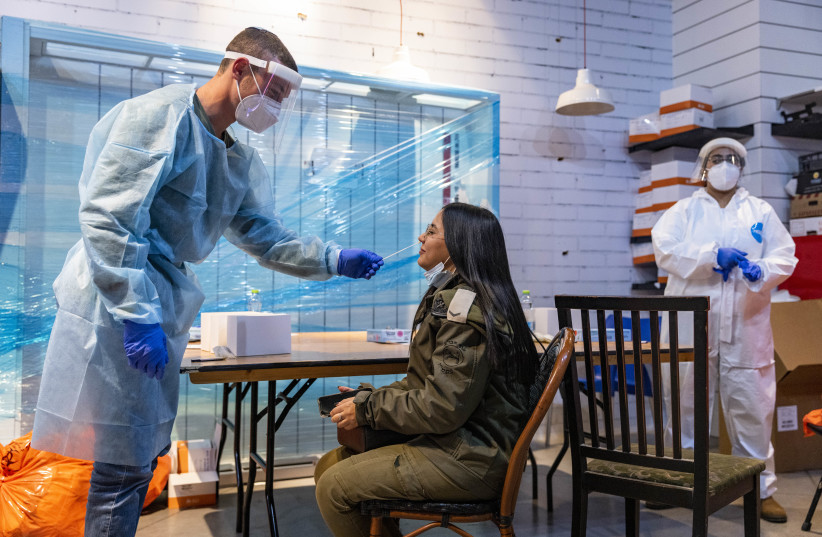Israel has made a major switch in the way it is dealing with the ongoing battle with the spread of Omicron. Until now, for symptomatic individuals and individuals exposed to a verified case, the country relied on PCR tests. These are highly accurate, but since they need to be processed by a laboratory, they take longer for the results to come through, resulting in longer periods of quarantine. The other main test was the less accurate antigen test that delivers a result withing a few minutes and does not need to be processed in a lab. These were mainly used to test children and other unvaccinated individuals to grant them a temporary Green Pass.
In addition, at-home antigen tests were employed when a high number of people needed to be tested in a short period, such as children before returning to school after a break, and they were recommended for those who wished to check themselves for any other reason.
With the policy change this week, PCRs are reserved for those aged 60 and over, or for people with underlying health conditions. Everyone else, if fully vaccinated, can now use a home antigen test instead of going to a testing station. Those who are not inoculated still need to get a supervised antigen test at a testing station.
Essentially, this places the onus on the individual to show responsibility and solidarity and do the right thing – test at home when necessary, report if sick and enter quarantine to avoid infecting others.
The reason for this dramatic shift is the extremely high numbers of infections – some 115,000 official active cases, the highest number since the beginning of the pandemic – and the expected continued rise in numbers. The testing system which has been used until now will be overloaded and people will be forced to stay in quarantine for unnecessary periods. This could soon bring the economy to a halt almost to the same extent as last year’s lockdowns, as parents remain at home with young children. Even workers in essential services will be affected.

The problem, as always, lies in the implementation.
It could become a mockery, the same way that people in the first lockdown had to sign a form that they had checked their temperature before going to work, or sending a child to school, became almost farcical.
It’s all a matter of trust. But unlike the declaration of health that was used early in the pandemic there is now another element at play: the cost factor.
When people were required to regularly test their temperature – the only easily available home administered indication of possible infection in those early days of the pandemic – there was a run on electronic thermometers and their price rose. Now, we are in a similar situation with the home antigen tests. Due to the high demand, supplies are not readily available and the cost has soared.
This is particularly critical for families with several children. With a packet of two tests costing around NIS 50, this could quickly escalate beyond the means of many families.
In addition, low-income families are also less likely to own cars to get to drive-in testing centers. Tales of long lines necessitating hours of waiting are now infamous.
For those in vehicles, the waiting period with young children is extremely hard and those who must wait standing up – often in dangerously crowded conditions while wearing masks – it is almost unbearable with young kids in tow. Furthermore, there is a built-in absurdity that those who are not vaccinated can use these testing stations for free, while the home tests cost money.
We were, therefore, pleased to hear Prime Minister Naftali Bennett promise yesterday that kindergarten and elementary-age schoolchildren would be provided with three free testing kits. This is a start, but it is not enough. Similarly, the promise to try to find a way to reduce the cost must come to fruition and cannot remain just an empty promise.
There are still many families and individuals for whom repeated home testing will be financially beyond their means. Israel – with its excellent public health system – must ensure that the principle of free good healthcare for all is maintained. This applies to disease prevention as much as treatment, of course. As head of the Knesset Law Committee MK Gilad Kariv (Labor) noted yesterday, since the country has compulsory free education, no child can be denied entrance to school because a family cannot afford the tests.
Making the antigen kits accessible to all will be the true test of how the health system and the country work.
